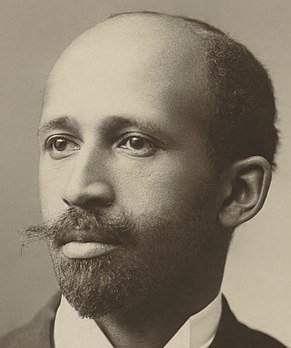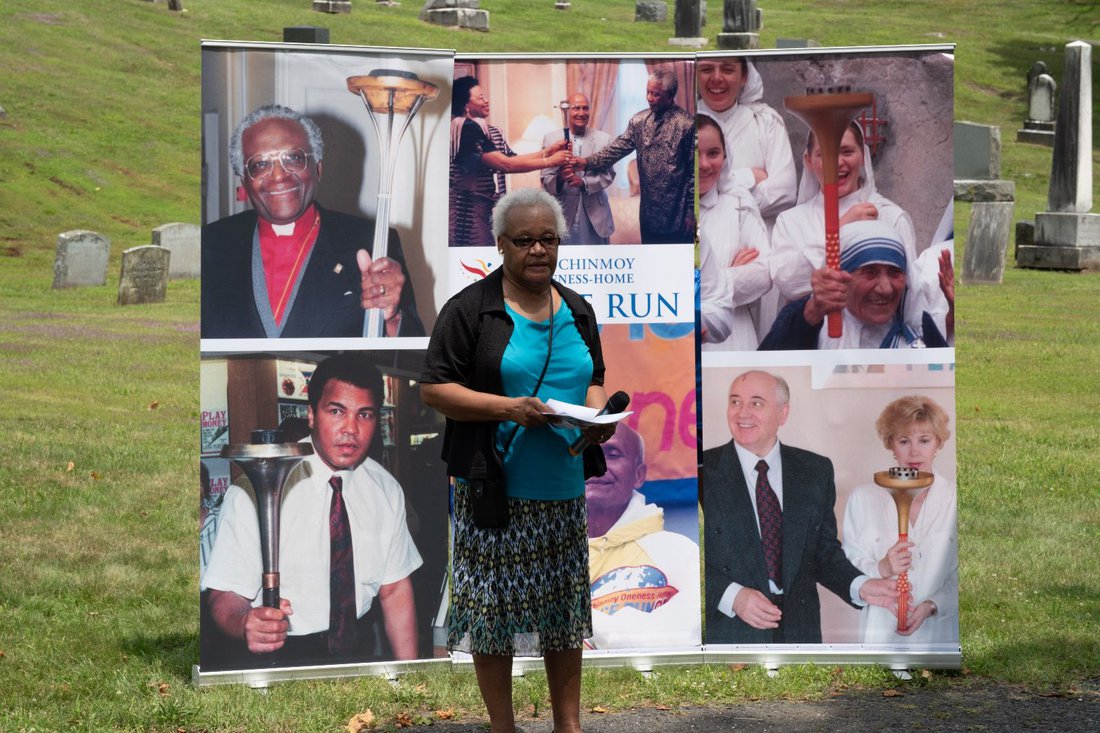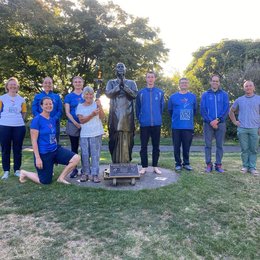
Randy Weinstein met us to run the torch into Great Barrington. He was a great help in organising our first event, having dedicated his life to to bringing recognition to WEB Du Bois' immense struggle and contribution for racial justice and world peace in the last century.

We met at the Mahaiwe Cemetary in Great Barrington at the family grave sites of relatives of W.E.B. Du Bois.

W.E.B Du Bois dedicated his life not only to racial justice but also to world peace.
Du Bois was an American sociologist, socialist, historian, and Pan-Africanist civil rights activist. Born in Great Barrington, Massachusetts, Du Bois grew up in a relatively tolerant and integrated community. After completing graduate work at the Friedrich Wilhelm University (in Berlin, Germany) and Harvard University, where he was the first African American to earn a doctorate, he became a professor of history, sociology, and economics at Atlanta University. Du Bois was one of the founders of the National Association for the Advancement of Colored People (NAACP) in 1909.
Du Bois was a prolific author. His collection of essays, The Souls of Black Folk, is a seminal work in African-American literature; and his 1935 magnum opus, Black Reconstruction in America, challenged the prevailing orthodoxy that blacks were responsible for the failures of the Reconstruction Era. Borrowing a phrase from Frederick Douglass, he popularized the use of the term color line to represent the injustice of the separate but equal doctrine prevalent in American social and political life. He opens The Souls of Black Folk with the central thesis of much of his life's work: "The problem of the twentieth century is the problem of the color-line."
His 1940 autobiography Dusk of Dawn is regarded in part as one of the first scientific treatises in the field of American sociology, and he published two other life stories, all three containing essays on sociology, politics and history. In his role as editor of the NAACP's journal The Crisis, he published many influential pieces. Du Bois believed that capitalism was a primary cause of racism, and he was generally sympathetic to socialist causes throughout his life. He was an ardent peace activist and advocated nuclear disarmament. The United States Civil Rights Act, embodying many of the reforms for which Du Bois had campaigned his entire life, was enacted a year after his death.

Randy spoke about the significance of the family grave sites to WEB Du Bois and the preservation of his legacy.

Congregational members of the Macedonian Baptist Church, Luci Leonard, Peter Wilson, Virginia Conway and Vanessa La Grande, performed a hymn.

Leigh Davis, Vice Chair of the Selectboard of Great Barrington, spoke beautifully of her experience leading to making Great Barrington her home.

Long time Peace Runner and American Civil Rights scholar, Ganapati Coleman, joined us from New York to share some thoughts on Du Bois' contribution to the Civil Rights movement and the importance of remembering the spiritual aspect of the movement with the continuing challenges we face for racial equality and peace in the United States and the world.

Torch-Bearer Awards were given to Gwendolyn VanSant,(pictured here on the left), and Wray Gunn,(not able to be present), who have worked tirelessly to preserve and promote the legacy of W.E.B. Du Bois, founder of the NAACP and architect of the civil rights movement in the U.S. Gwen has also worked in a wide variety of public service areas including indigenous rights, gender equity, public health and anti-poverty work.
Holding the torch with Gwendolyn is long-time Massachusetts Peace Run Coordinator, Begabati Lennihan.

Virginia Conway kindly accepted the award on behalf of Wray Gunn. Standing beside her is Tilvila Hurwit, who co-coordinated todays events.

Gwendolyn is CEO and Founding Executive Director of BRIDGE (Berkshire Resources for Integration of Diverse Groups through Education)a grassroots organization dedicated to advancing equity and justice by promoting cultural competence, positive psychology, and mutual understanding and acceptance. Thank you to the BRIDGE members who came along to celebrate Gwendolyn's Award.

We were deeply honored to have a window into this wonderfully dynamic and progressive community and learn a little about all they are doing. The self giving spirit of the people of Great Barrington gave us great inspiration- Thank you all for welcoming the Peace Run and recognising our shared goal of a Oneness-World Family!

Amazingly, this nice man actually lives right near where many New York Peace Runners live, in Jamaica, Queens. He was visiting his parents in Massachusetts when he saw our vans and came to say hi!

We met with a delightful cross section of selflessly dedicated peace builders and local heroes!
We began the event with an Interfaith Prayer Gathering for Peace. Soulful Prayers were offered by Pastor Joel Bergman from Zion Lutheran Church, Becky Crane from Cathedral of the Beloved, Sister Colette Hanlon from St Joseph's Church, and Adam Ibrahim of the Pittsfield Islamic Centre. Our gratitude to all!

We passed the torch around and everyone shared their prayers and wishes for peace. Pictured holding the torch is Suleman Ibrahim, General Manager of the Pittsfield Islamic Center, and father of Adam who read the prayer.

We were thrilled to meet Officer Darren Derby, a beloved local who selflessly dedicates any spare time he has to serving his community and trying to improve the often generalized bad reputation of police officers. He likes to give out free ice cream, visits schools, and in many small ways serve his local community. He nominated and introduced our next Torch Bearer recipient, Madison Quinn.

Madison is 23 years old and a recent graduate of nursing, specializing in Pediatrics. At the age of 13 she was inspired to raise money for children afflicted by cancer, and started a non-profit called "Strong Little Souls" which she has been running and growing in her spare time for 10 years now. Her family help her send care packages all over the country. We were greatly honored to meet Madison and extremely inspired by what she does!

Thank you to James McGrath, the Park, Open Space and Natural Resource Program Manager for the City of Pittsfield, for his enthusiastic help in having this tree dedicated as a Sri Chinmoy Peace Tree! The tree was dedicated in the memory of Robert L. Presutti, a decades long volunteer arborist for the City of Pittsfield, who recently passed, and also had a special fondness for this particular tree.

Next we headed to Wahconah Park to pass the torch and introduce the Peace Run to players and spectators at the Pittsfield Suns vs Westfield Starfires college game.
Built in 1892, Wahconah Park’s classic and intimate design offers fans a ballpark experience that harkens back to the early decades of attending a ballgame. Unique to ballparks everywhere is its home plate facing west that creates one of baseball’s most unusual events on a sunny summer evening – the 20 minute Sun Delay . In the July 23, 1990 issue of Sports Illustrated, author Daniel Okrent raved about the park in his column entitled “Just A Little Bit of Heaven – Pittsfield’s Wahconah Park is Baseball as it Oughta Be.”

We were thrilled to meet Andres Hulfachor(holding the torch), relief pitcher for the Suns team, who we owe a debt of gratitude to for most enthusiastically helped organise our visit, and also thanks to Sander Stotland, in the red t-shirt, who is the President and General Manager of the Pittsfield Suns Collegiate Baseball Team.










































